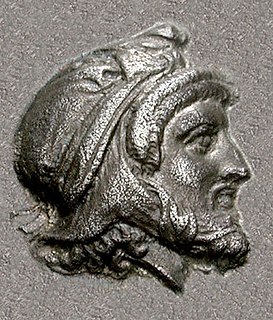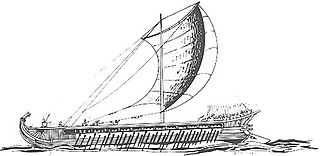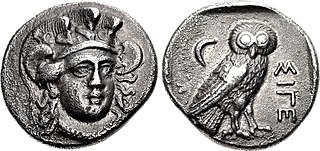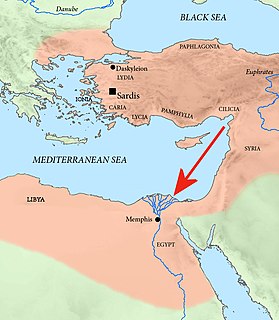
The Peloponnesian War was an ancient Greek war fought by the Delian League led by Athens against the Peloponnesian League led by Sparta. Historians have traditionally divided the war into three phases. In the first phase, the Archidamian War, Sparta launched repeated invasions of Attica, while Athens took advantage of its naval supremacy to raid the coast of the Peloponnese and attempt to suppress signs of unrest in its empire. This period of the war was concluded in 421 BC, with the signing of the Peace of Nicias. That treaty, however, was soon undermined by renewed fighting in the Peloponnese. In 415 BC, Athens dispatched a massive expeditionary force to attack Syracuse, Sicily; the attack failed disastrously, with the destruction of the entire force in 413 BC. This ushered in the final phase of the war, generally referred to either as the Decelean War, or the Ionian War. In this phase, Sparta, now receiving support from the Achaemenid Empire, supported rebellions in Athens's subject states in the Aegean Sea and Ionia, undermining Athens's empire, and, eventually, depriving the city of naval supremacy. The destruction of Athens's fleet in the Battle of Aegospotami effectively ended the war, and Athens surrendered in the following year. Corinth and Thebes demanded that Athens should be destroyed and all its citizens should be enslaved, but Sparta refused.

The Battle of Salamis was a naval battle fought between an alliance of Greek city-states under Themistocles and the Persian Empire under King Xerxes in 480 BC which resulted in a decisive victory for the outnumbered Greeks. The battle was fought in the straits between the mainland and Salamis, an island in the Saronic Gulf near Athens, and marked the high-point of the second Persian invasion of Greece.
This article concerns the period 359 BC – 350 BC.
Year 356 BC was a year of the pre-Julian Roman calendar. At the time, it was known as the Year of the Consulship of Ambustus and Laenas. The denomination 356 BC for this year has been used since the early medieval period, when the Anno Domini calendar era became the prevalent method in Europe for naming years.
Year 364 BC was a year of the pre-Julian Roman calendar. At the time, it was known as the Year of the Consulship of Peticus and Calvus. The denomination 364 BC for this year has been used since the early medieval period, when the Anno Domini calendar era became the prevalent method in Europe for naming years.

Pharnabazus II was a Persian soldier and statesman, and Satrap of Hellespontine Phrygia. He was the son of Pharnaces II of Phrygia and grandson of Pharnabazus I, and great-grandson of Artabazus I. He and his male ancestors, forming the Pharnacid dynasty, had governed the satrapy of Hellespontine Phrygia from its headquarters at Dascylium since 478 BC. He married Apama, daughter of Artaxerxes II of Persia, and their son Artabazus was likewise a satrap of Phrygia.

For war between the navy of Rhodes and the navy of Macedon in 201 BC, see Battle of Lade.

The Corinthian War was an ancient Greek conflict lasting from 395 BC until 387 BC, pitting Sparta against a coalition of four allied states, Thebes, Athens, Corinth, and Argos, who were initially backed by Persia. The immediate cause of the war was a local conflict in northwest Greece in which both Thebes and Sparta intervened. The deeper cause was hostility towards Sparta provoked by that city's "expansionism in Asia Minor, central and northern Greece and even the west".

The Battle of Cnidus, was an operation conducted by the Achaemenid Empire against the Spartan naval fleet during the Corinthian War. A fleet under the joint command of Pharnabazus and former Athenian admiral, Conon, destroyed the Spartan fleet led by the inexperienced Peisander, ending Sparta's brief bid for naval supremacy.
Cersobleptes, also spelled Kersobleptes, Kersebleptes, and Cersebleptes, was son of Cotys, king of Thrace, on whose death in 358 BC he inherited the kingdom in conjunction with Berisades and Amadocus II, who were probably his brothers. He was very young at the time, and the whole management of his affairs was assumed by the Euboean adventurer, Charidemus, who was connected by marriage with the royal family. The area controlled by Cersobleptes was east of the river Hebrus.
The Battle of Chios was fought in 201 BC between the fleet of Philip V of Macedon against the combined fleet of Rhodes, Pergamum, Byzantium and Cyzicus.
The Battle of Mytilene was a battle fought in 406 BC between Athens and Sparta. The Spartans were victorious.
Mindarus was a Spartan admiral who commanded the Peloponnesian fleet in 411 and 410 BC, during the Peloponnesian War. Successful in shifting the theatre of war into the Hellespont, he then experienced a string of defeats; in the third and final of these, he was killed and the entire Peloponnesian fleet was captured or destroyed.
The Social War, also known as the War of the Allies, was fought from 357 BC to 355 BC between Athens with the Second Athenian League and the allied city-states of Chios, Rhodes, Cos and Byzantion.

The Battle of Ponza (1552) was a naval battle that occurred near the Italian island of Ponza. The battle was fought between a Franco-Ottoman fleet under Dragut and a Genoese fleet commanded by Andrea Doria. The Genoese were defeated and lost seven galleys captured. The battle made it easier for the Ottoman fleet to raid the coasts of Sicily, Sardinia and Italy for the next three years.
Astyochus or Astyochos was a Spartan navarch who served as commander of the collective Spartan naval forces along the coast of Asia Minor from 412–411 BC. He is regarded by many contemporaries and modern scholars as a key reason for Sparta's early failures in the Ionian War. His expeditions consisting of involvements in Lesbos, Chios, Erythrae and Clazomenae all proved unsuccessful. He also refused requests for help from Chios, causing the Spartan administration to become increasingly dissatisfied with his leadership. Thucydides portrays Astyochus as timid and inept, and also depicts him often in conflict with his peers in Ionia. Toward the end of his role of commander, he exhibited great reluctance to attack the Athenians and also failed to properly pay his troops, leading to riots and violence, and eventually, his removal as commander in 412 BC, to be replaced by the Spartan Mindarus.













